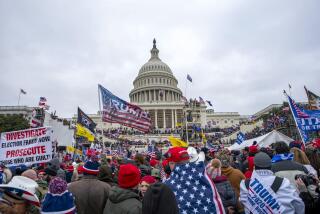Miranda Law, Congress Collide in High Court
- Share via
WASHINGTON — The Supreme Court revisited a legal battle from the 1960s on Wednesday, debating whether to overturn the landmark ruling that requires police to warn suspects of their right to remain silent.
But if the justices’ comments and questions are a good indicator, a majority of them think it is too late now to overturn the Miranda ruling.
Thanks to a generation of police dramas on television, Miranda warnings have become familiar to most Americans. They stem from the 5-4 decision in Miranda vs. Arizona, which said in 1966 that police must warn suspects of their rights before they question them.
One justice hailed the warnings as “a hallmark of American justice,” a symbol of the court’s determination to protect individuals from the power of the police.
But conservative critics have never accepted the legitimacy of
the Miranda ruling and have long maintained that the liberal court of that era overstepped its authority. Both then and now, these critics have said that the warnings tie the hands of police, discourage suspects from confessing and sometimes allow the guilty to go free because a police officer fails to give the warnings at the right time.
Responding to those complaints, an angry Congress in 1968 passed an anti-crime bill that said confessions “voluntarily given” can be used in court, regardless of what the Supreme Court said in the Miranda decision.
That long-ignored law has been revived recently and became the focus of Wednesday’s argument.
Chief Justice Expresses Doubt
Even Chief Justice William H. Rehnquist, who often has voiced disdain for the Miranda ruling, sounded a bit doubtful about overturning it based on the 32-year-old law.
“We are faced with a conundrum,” he told a lawyer who was urging repeal of the Miranda decision. For more than three decades, the court has tossed out state convictions in cases where police did not warn suspects of their rights, he noted. “If the rule has been applied to the states, how can it be other than a constitutional rule?” Rehnquist asked.
And if it is a constitutional rule, how can Congress overturn it?
University of Utah professor Paul Cassell, the lawyer who was asked to make the case for overturning Miranda, replied that the decision was “a provisional, interim judgment that invited Congress to consider other approaches.”
That answer drew frowns and skeptical questions from several justices. Rehnquist’s comments summed up the dilemma for conservative critics. Cassell argued that the Miranda warnings are not required by the Constitution but instead were just suggestions for police.
But if his view prevails, the Supreme Court would be admitting now that it has wrongly and foolishly overturned state convictions that were not constitutional violations in the first place.
Four justices--David H. Souter, Ruth Bader Ginsburg, Stephen G. Breyer and John Paul Stevens--signaled that they would stand behind the Miranda warnings.
Souter said that the Miranda decision changed the law in an important way. Before, suspects could be kept isolated for days on end and pressed to confess. By contrast, the Miranda ruling said that they must be told of their rights when they are arrested.
“It said we are going to a different system, a system that requires a knowing waiver of your rights,” Souter said.
Unhappy with the liberal court of that era, Congress wanted to “return to the old system,” Souter said, describing the 1968 law. But Congress cannot overturn a constitutional ruling of the Supreme Court, he added.
As usual, the deciding votes probably will be cast by Justices Sandra Day O’Connor and Anthony M. Kennedy, two moderate conservatives appointed by President Reagan.
But the two justices did not signal clearly how they would decide the matter. Both sounded skeptical of relying on the 1968 law. In the past, the two have made clear that they are unwilling to overturn major legal precedents.
“The case has not been made for overturning Miranda vs. Arizona,” U.S. Solicitor General Seth Waxman told the court. The decision set a “bright line legal standard” that has benefited police, suspects and judges, he said.
When a person is taken into custody, he must be warned by officers of his right to remain silent, that anything he says may be used against him, that he can request a lawyer to be present during questioning and that a lawyer will be provided if he cannot afford one.
Derived From 5th Amendment
Although the warnings may be familiar, their constitutional origin is less so. The 5th Amendment to the Constitution says: “No person . . . shall be compelled in any criminal case to be a witness against himself.” This is often referred as the right against self-incrimination.
Before 1966, the court said confessions were legal if they were voluntary. But judging that question often proved difficult. For example, if a defendant made incriminating comments only after being held in isolation for 36 hours, was his confession voluntary?
The late Chief Justice Earl Warren, who presided over the high court in 1966, thought his opinion in the Miranda case could resolve that matter by requiring the warnings before questioning.
The issue returned this year in a case of a Virginia bank robbery suspect who made incriminating comments before he was read his rights.
The justices will meet privately to discuss the case (Dickerson vs. United States, 99-5525) and issue a ruling on the fate of the Miranda warnings by late June.
More to Read
Sign up for Essential California
The most important California stories and recommendations in your inbox every morning.
You may occasionally receive promotional content from the Los Angeles Times.













